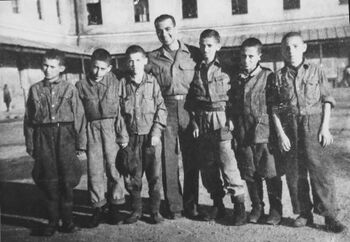Dan Labanovski (M / Lithuania, 1933), Holocaust survivor

Dan Labanovski / Daniel Lebanovski / Daniel Kabinowsky (M / Lithuania, 1933), Holocaust survivor.
- KEYWORDS : <Lithuania> <Kovno Ghetto> <Dachau> <Kovno Boys> <Auschwitz> <Death March> <Mauthausen> <Death March> <Gunskirchen>
Biography
Dan Labanovski was one of the Kovno Boys, liberated at Gunskirchen.
Dan Labanovski was born in 1933 in Kovno, Lithuania. He was forced to live in the Kovno Ghetto. After the liquidation of the ghetto in 1944 he was sent to Dachau. There he was one of the 131 Kovno Boys who were sent to Auschwitz. With a death march in January 1945 he arrived in Mauthausen on Jan 30, 1945 and then transferred to Gunskirchen. He was part of a group of 37 child survivors from Kovno liberated at Gunskirchen. After the war, he could not find any member off his family who was still alive. After staying in orphanages in Poland and Germany, he immigrated to Palestine in 1946 and lived in Ramat Hasharon.
USHMM Oral Interview
Daniel Labanovski, born in 1933 in Kaunas, Lithuania, discusses being an only child; his family's affluence; cordial relations with non-Jews; a large and close extended family; attending Jewish school; Soviet occupation; German invasion; ghettoization; his father working in the transport system; telling Germans his parents were out when they hid during round-ups; hiding during the children’s round-up; capture; escape with his father's help; deportation with his parents to Stutthof; separation from his mother (he never saw her again) when they were sent to Landsberg, then, even more painfully, from his father, when he was sent with other children to Dachau; transfer two weeks later to Auschwitz-Birkenau; slave labor; woman prisoners giving him extra food; a death march, then train transfer to Mauthausen; observing cannibalism; conflicts among ethnic prisoner groups; transfer to Gunskirchen; receiving a Red Cross package; abandonment by the guards; walking with others to Wels; liberation by United States troops; assistance from the Joint; a six-month journey returning to Kaunas; learning his father had been killed; reunion with an uncle; living in an orphanage; being smuggled to Ulm; living in an Agudat Israel home; joining a Gordonyah group; traveling to Marseille; illegal immigration by ship to Palestine in 1947; interdiction by the British; incarceration on Cyprus for six months; choosing to live in a Youth Aliyah home; attending an Ort school; military enlistment; marriage; his four children; reunions with the children's group; a recent trip to Kaunas; a futile attempt to trace his family property; and Youth Aliyah helping him in his murdered family's stead. (He shows photographs and documents.)